File Info
| Exam | ISTQB Agile Public Sector Exam |
| Number | ISTQB-Agile-Public |
| File Name | ISTQB.ISTQB-Agile-Public.VCEplus.2024-09-12.25q.tqb |
| Size | 127 KB |
| Posted | Sep 12, 2024 |
| Download | ISTQB.ISTQB-Agile-Public.VCEplus.2024-09-12.25q.tqb |
How to open VCEX & EXAM Files?
Files with VCEX & EXAM extensions can be opened by ProfExam Simulator.
Coupon: MASTEREXAM
With discount: 20%
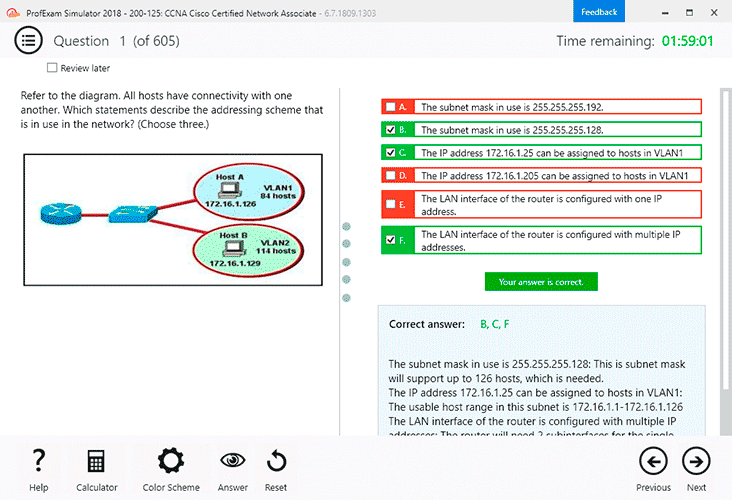
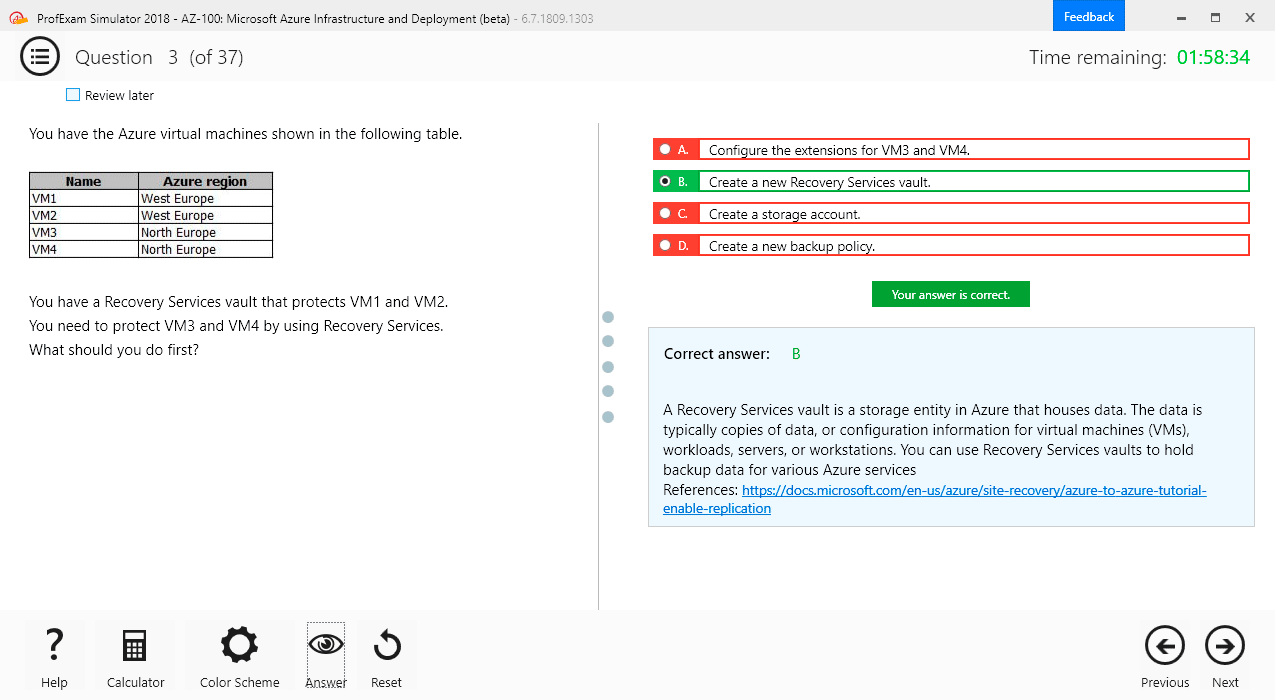
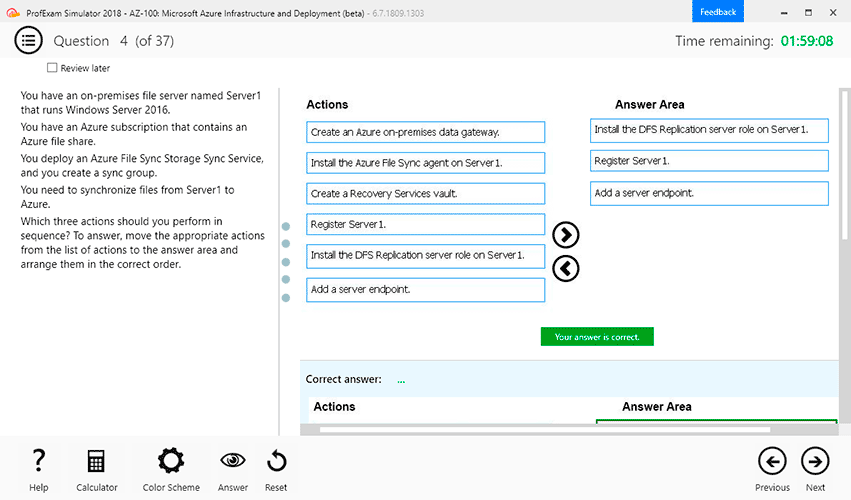
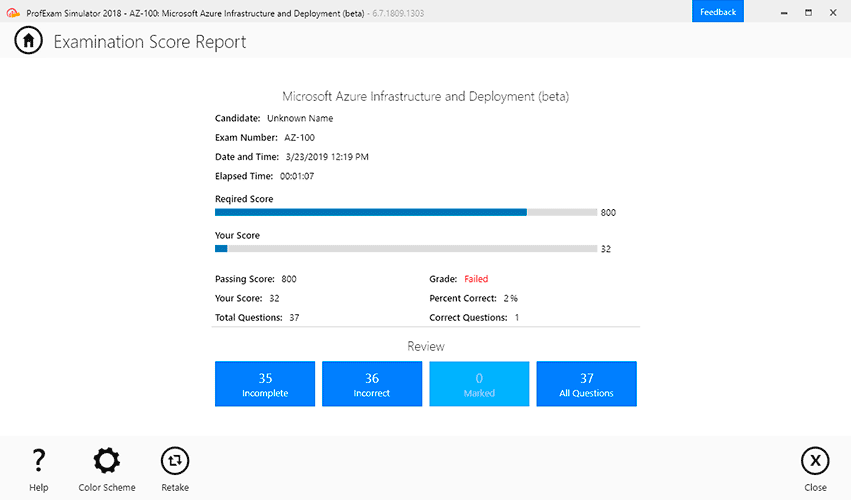
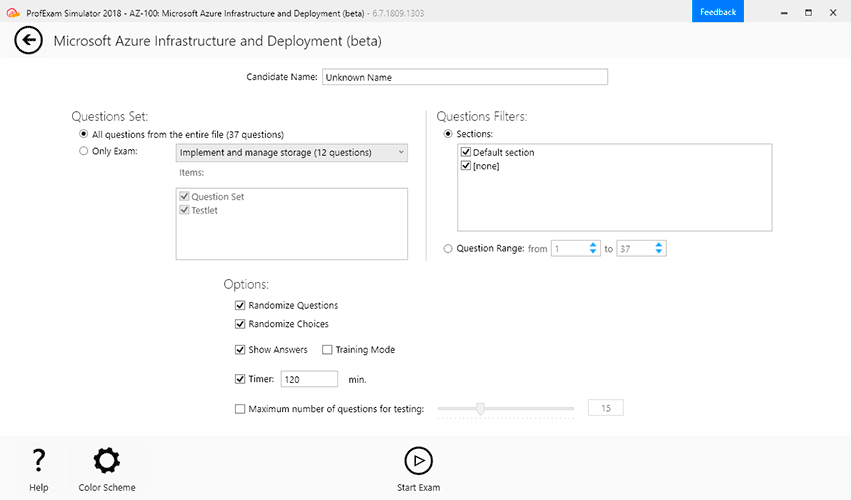
Demo Questions
Question 1
In a sprint planning, the product owner presents a user story written on a card. The team starts having a discussion with the product owner to get an understanding on how the software should work.
The user story written on the card is:
'As a customer, I want to subscribe to the mailing list so that I can receive the latest deal in an email.'
By applying the 3C concept, which ONE of the following statements is CORRECT?
SELECT ONE OPTION
- Conversation should include the acceptance criteria discussion.
- Product owner has written a user story and confirmation is not needed.
- The card should contain requirements not the user story.
- The conversation is not required and the team should start developing.
Correct answer: A
Explanation:
The 3C concept in Agile development refers to Card, Conversation, and Confirmation. This concept emphasizes the collaborative and iterative nature of defining user stories and their acceptance criteria in Agile projects. In the context of the provided user story, 'As a customer, I want to subscribe to the mailing list so that I can receive the latest deal in an email,' option A is correct. The conversation should include the acceptance criteria discussion, which is an integral part of the 3C concept.The Card represents the user story itself, which is a brief statement describing a feature or requirement from the user's perspective. The Conversation involves discussions between the development team and the product owner (or other stakeholders) to clarify the details and ensure a mutual understanding of the user story. This conversation is crucial for exploring the user story's implications, discussing potential implementation approaches, and agreeing on the acceptance criteria that define when the story is considered complete and satisfactory.Confirmation involves agreeing on and documenting the acceptance criteria that emerge from the conversation. These criteria serve as a checklist to ensure that the implemented feature meets the user's needs and expectations as defined in the user story.Option A is the verified answer because it accurately reflects the importance of including acceptance criteria discussions in the conversation phase of the 3C concept. This practice aligns with Agile principles by ensuring clarity, shared understanding, and a focus on delivering value to the customer. The 3C concept in Agile development refers to Card, Conversation, and Confirmation. This concept emphasizes the collaborative and iterative nature of defining user stories and their acceptance criteria in Agile projects. In the context of the provided user story, 'As a customer, I want to subscribe to the mailing list so that I can receive the latest deal in an email,' option A is correct. The conversation should include the acceptance criteria discussion, which is an integral part of the 3C concept.
The Card represents the user story itself, which is a brief statement describing a feature or requirement from the user's perspective. The Conversation involves discussions between the development team and the product owner (or other stakeholders) to clarify the details and ensure a mutual understanding of the user story. This conversation is crucial for exploring the user story's implications, discussing potential implementation approaches, and agreeing on the acceptance criteria that define when the story is considered complete and satisfactory.
Confirmation involves agreeing on and documenting the acceptance criteria that emerge from the conversation. These criteria serve as a checklist to ensure that the implemented feature meets the user's needs and expectations as defined in the user story.
Option A is the verified answer because it accurately reflects the importance of including acceptance criteria discussions in the conversation phase of the 3C concept. This practice aligns with Agile principles by ensuring clarity, shared understanding, and a focus on delivering value to the customer.
Question 2
Which of the following is NOT a statement of value from the Agile Manifesto?
SELECT ONE OPTION
- software over comprehensive documentation.
- Responding to change over following a plan.
- Processes and tools over individuals and interactions.
- Customer collaboration over contract negotiation.
Correct answer: C
Explanation:
The Agile Manifesto, a foundational document for Agile development, outlines four core values intended to guide Agile practices. Option C, 'Processes and tools over individuals and interactions,' is not a statement of value from the Agile Manifesto. In fact, the correct value stated in the Agile Manifesto is the opposite: 'Individuals and interactions over processes and tools.'The Agile Manifesto values are as follows:Individuals and interactions over processes and toolsWorking software over comprehensive documentationCustomer collaboration over contract negotiationResponding to change over following a planThese values emphasize the importance of people, collaboration, adaptability, and the delivery of functional software in Agile development. The manifesto suggests that while processes, tools, documentation, contracts, and plans have their place, they should not overshadow the importance of human elements, effective collaboration, and responsiveness to change.Option C is the verified answer because it misrepresents the Agile Manifesto's values by prioritizing processes and tools over individuals and interactions, which contradicts the manifesto's emphasis on the latter. This understanding is crucial for implementing Agile practices that align with the manifesto's intent to foster more adaptive, people-oriented, and customer-focused approaches to software development. The Agile Manifesto, a foundational document for Agile development, outlines four core values intended to guide Agile practices. Option C, 'Processes and tools over individuals and interactions,' is not a statement of value from the Agile Manifesto. In fact, the correct value stated in the Agile Manifesto is the opposite: 'Individuals and interactions over processes and tools.'
The Agile Manifesto values are as follows:
Individuals and interactions over processes and tools
Working software over comprehensive documentation
Customer collaboration over contract negotiation
Responding to change over following a plan
These values emphasize the importance of people, collaboration, adaptability, and the delivery of functional software in Agile development. The manifesto suggests that while processes, tools, documentation, contracts, and plans have their place, they should not overshadow the importance of human elements, effective collaboration, and responsiveness to change.
Option C is the verified answer because it misrepresents the Agile Manifesto's values by prioritizing processes and tools over individuals and interactions, which contradicts the manifesto's emphasis on the latter. This understanding is crucial for implementing Agile practices that align with the manifesto's intent to foster more adaptive, people-oriented, and customer-focused approaches to software development.
Question 3
Iteration planning for Sprint 5 of your current project is complete. The plan for the sprint is to increase performance of the system, which of the following acceptance criteria would you expect for Sprint 5?
i) User access for all roles has been validated.
ii) A static analysis tool has been executed for all code.
iii) 100% of the existing regression test suite has passed.
Iv) System is responding In less than 3 seconds, 90% of the time.
v) A new version of Internet Explorer has been included.
SELECT ONE OPTION
- ii, v
- iii, iv
- iv, v
- i, iii
Correct answer: B
Explanation:
The acceptance criteria for a sprint focused on improving the performance of a system, like the one described for Sprint 5, typically include ensuring that the system meets specific performance benchmarks and that the functionality implemented in previous sprints continues to work as expected. Therefore, the most relevant acceptance criteria for such a sprint would be:iii) '100% of the existing regression test suite has passed.' This criterion ensures that the new performance enhancements have not adversely affected the existing functionalities of the system. It's a common practice in agile projects to maintain the integrity and quality of the system by running regression tests. This is supported by the notion that continuous testing and quality assurance are integral components of agile methodologies, ensuring that each increment of the project maintains and improves the quality of the product (Source: Agile Project Management methodologies).iv) 'System is responding in less than 3 seconds, 90% of the time.' This criterion directly addresses the goal of the sprint, which is to increase the performance of the system. Setting a specific target for response times is a quantifiable and testable way to measure the improvement in performance. This aligns with agile principles, which emphasize delivering valuable, working software and encourage adaptive planning and continuous improvement. Performance targets like these help the team focus on delivering specific, valuable improvements to the system (Source: Principles behind the Agile Manifesto).Options i) and v) are less relevant to the specific focus of Sprint 5, which is on performance improvement, and more about user roles and software compatibility, which are not directly tied to the performance objectives of the sprint. Therefore, options iii) and iv) constitute the most appropriate acceptance criteria for Sprint 5, focusing on ensuring that the system's performance meets the set benchmarks without compromising existing functionalities. The acceptance criteria for a sprint focused on improving the performance of a system, like the one described for Sprint 5, typically include ensuring that the system meets specific performance benchmarks and that the functionality implemented in previous sprints continues to work as expected. Therefore, the most relevant acceptance criteria for such a sprint would be:
iii) '100% of the existing regression test suite has passed.' This criterion ensures that the new performance enhancements have not adversely affected the existing functionalities of the system. It's a common practice in agile projects to maintain the integrity and quality of the system by running regression tests. This is supported by the notion that continuous testing and quality assurance are integral components of agile methodologies, ensuring that each increment of the project maintains and improves the quality of the product (Source: Agile Project Management methodologies).
iv) 'System is responding in less than 3 seconds, 90% of the time.' This criterion directly addresses the goal of the sprint, which is to increase the performance of the system. Setting a specific target for response times is a quantifiable and testable way to measure the improvement in performance. This aligns with agile principles, which emphasize delivering valuable, working software and encourage adaptive planning and continuous improvement. Performance targets like these help the team focus on delivering specific, valuable improvements to the system (Source: Principles behind the Agile Manifesto).
Options i) and v) are less relevant to the specific focus of Sprint 5, which is on performance improvement, and more about user roles and software compatibility, which are not directly tied to the performance objectives of the sprint. Therefore, options iii) and iv) constitute the most appropriate acceptance criteria for Sprint 5, focusing on ensuring that the system's performance meets the set benchmarks without compromising existing functionalities.
Question 4
Which tasks are typically performed by a tester on an Agile project?
i) Implementing test strategy.
ii) Documenting business requirements.
iii) Measuring and reporting test coverage.
iv) Coaching development team in relevant aspects of testing.
v) Executing test-driven development tests.
SELECT ONE OPTION
- i, iii, iv
- ii, iv, v
- ii, v
- i, iii
Correct answer: A
Explanation:
In an agile project, testers often perform tasks beyond traditional testing roles, including implementing test strategy (i), measuring and reporting test coverage (iii), and coaching the development team on relevant aspects of testing (iv). Implementing test strategy involves planning how testing will be conducted within the agile framework, ensuring that testing aligns with agile principles and practices. Measuring and reporting test coverage help the team understand the extent to which the codebase is tested, which is crucial for maintaining quality in fast-paced agile environments. Coaching the development team involves sharing knowledge on testing best practices and fostering a quality-centric mindset across the team. These activities contribute to the collaborative and iterative nature of agile projects, where continuous feedback and improvement are emphasized. In an agile project, testers often perform tasks beyond traditional testing roles, including implementing test strategy (i), measuring and reporting test coverage (iii), and coaching the development team on relevant aspects of testing (iv). Implementing test strategy involves planning how testing will be conducted within the agile framework, ensuring that testing aligns with agile principles and practices. Measuring and reporting test coverage help the team understand the extent to which the codebase is tested, which is crucial for maintaining quality in fast-paced agile environments. Coaching the development team involves sharing knowledge on testing best practices and fostering a quality-centric mindset across the team. These activities contribute to the collaborative and iterative nature of agile projects, where continuous feedback and improvement are emphasized.
Question 5
Which of the following statements about a test charter are CORRECT?
i) It is used mainly in exploratory tests.
ii) It is used to monitor a test process.
iii) It may make reference to user stories.
iv) It contains notes taken during a test session.
v) It is used to outline the company test policy.
SELECT ONE OPTION
- i, iii, iv
- ii, iv, v
- ii, iii, iv
- ii. v
Correct answer: A
Explanation:
A test charter is primarily used in exploratory testing (i) to guide the test session with a clear mission or objective, which might be related to specific functionalities, user stories, or areas of the application, making reference to user stories (iii) plausible. It also contains notes taken during the test session (iv), which are crucial for documenting observations, anomalies, and insights gained during exploratory testing. This approach aligns with Agile's emphasis on individuals and interactions and responding to change, as exploratory testing is inherently adaptive and relies on the tester's skill, creativity, and intuition. It contrasts with more traditional, documentation-heavy approaches, emphasizing the value of working software and collaboration. A test charter is primarily used in exploratory testing (i) to guide the test session with a clear mission or objective, which might be related to specific functionalities, user stories, or areas of the application, making reference to user stories (iii) plausible. It also contains notes taken during the test session (iv), which are crucial for documenting observations, anomalies, and insights gained during exploratory testing. This approach aligns with Agile's emphasis on individuals and interactions and responding to change, as exploratory testing is inherently adaptive and relies on the tester's skill, creativity, and intuition. It contrasts with more traditional, documentation-heavy approaches, emphasizing the value of working software and collaboration.
Question 6
Which agile development approach incorporates the following practices:
- a project is divided into iterations called sprints
- each sprint results in a potentially releasable/shippable product?
SELECT ONE OPTION
- Kanban
- Continuous Integration
- Scrum
- Extreme Programming
Correct answer: C
Explanation:
Scrum is the agile development approach that incorporates the practice of dividing a project into iterations called sprints, with each sprint resulting in a potentially releasable/shippable product. Scrum's iterative and incremental approach allows teams to deliver working software frequently, with a focus on delivering tangible value to the customer at the end of each sprint. Scrum is the agile development approach that incorporates the practice of dividing a project into iterations called sprints, with each sprint resulting in a potentially releasable/shippable product. Scrum's iterative and incremental approach allows teams to deliver working software frequently, with a focus on delivering tangible value to the customer at the end of each sprint.
Question 7
You are a tester in an agile team. The user story you are due to test is still under development so your tests are blocked. The main issue holding progress on this user story is that the developer's unit tests are constantly failing.
As an agile tester, which of the following actions should you take?
SELECT ONE OPTION
- Create a bug report for each of your blocked tests.
- Review the design of the problematic user story and improve it where possible.
- Work together with the developer, suggesting reasons why the tests are failing.
- Use the time to improve and automate existing test cases of other user stories.
Correct answer: C
Explanation:
In Agile teams, collaboration and direct communication are key. When faced with blocked tests due to ongoing development or failing unit tests, an agile tester should collaborate with the developer to identify and resolve the issues. This approach encourages teamwork, knowledge sharing, and problem-solving, leading to more efficient and effective resolution of blocking issues. In Agile teams, collaboration and direct communication are key. When faced with blocked tests due to ongoing development or failing unit tests, an agile tester should collaborate with the developer to identify and resolve the issues. This approach encourages teamwork, knowledge sharing, and problem-solving, leading to more efficient and effective resolution of blocking issues.
Question 8
Which of the following is a risk that continuous integration introduces?
SELECT ONE OPTION
- Testers sometimes have too many builds to test, which reduces the quality of testing.
- Developer's workload is increased, which can result in a reduction of output.
- Teams no longer have the ability to run manual tests, as all tests must be automated.
- Teams sometimes over-rely on unit tests and exclude some important system and acceptance tests.
Correct answer: A
Explanation:
Continuous integration introduces the risk of having too many builds for testers to evaluate, potentially reducing the quality of testing. With frequent integration of new code and automated builds, testers may face challenges in keeping up with the pace, leading to less thorough testing and the possibility of defects slipping through. Continuous integration introduces the risk of having too many builds for testers to evaluate, potentially reducing the quality of testing. With frequent integration of new code and automated builds, testers may face challenges in keeping up with the pace, leading to less thorough testing and the possibility of defects slipping through.
Question 9
Which of the following describes the main purpose of a task management tool in agile projects?
SELECT ONE OPTION
- A task management tool allows developers to continuously integrate their code.
- A task management tool is used by team members to share ideas and collaborate on assigned tasks.
- A task management tool is used to manage and track user stories, tests and other tasks.
- A task management tool is used to store source code and automated tests.
Correct answer: C
Explanation:
In agile projects, task management tools play a crucial role in facilitating project management and team collaboration. Specifically, option C accurately describes the primary function of a task management tool in agile contexts. These tools are designed to manage and track various elements of agile projects, including user stories, tests, tasks, and more, thereby enabling teams to maintain visibility and control over the project's progress.Agile methodologies prioritize adaptability, customer collaboration, and the delivery of value through iterative development cycles. Task management tools support these principles by providing a platform for organizing work, prioritizing tasks, and ensuring that all team members are aligned on the project's objectives and progress. This alignment is essential for maintaining the agility and responsiveness characteristic of agile projects.For example, the Scrum framework, a popular agile methodology, involves creating a product backlog that contains all the user stories and tasks needed for the project. The task management tool would be used to track these items through various stages of development, from the backlog to in-progress, testing, and completion. This tracking ensures that the team can adapt to changes, manage workloads effectively, and deliver increments of value to the customer consistently.In summary, option C is the verified answer as it encapsulates the essential purpose of a task management tool in agile projects, which is to manage and track user stories, tests, and other tasks, thereby supporting the agile principles of adaptability, customer collaboration, and iterative delivery of value. In agile projects, task management tools play a crucial role in facilitating project management and team collaboration. Specifically, option C accurately describes the primary function of a task management tool in agile contexts. These tools are designed to manage and track various elements of agile projects, including user stories, tests, tasks, and more, thereby enabling teams to maintain visibility and control over the project's progress.
Agile methodologies prioritize adaptability, customer collaboration, and the delivery of value through iterative development cycles. Task management tools support these principles by providing a platform for organizing work, prioritizing tasks, and ensuring that all team members are aligned on the project's objectives and progress. This alignment is essential for maintaining the agility and responsiveness characteristic of agile projects.
For example, the Scrum framework, a popular agile methodology, involves creating a product backlog that contains all the user stories and tasks needed for the project. The task management tool would be used to track these items through various stages of development, from the backlog to in-progress, testing, and completion. This tracking ensures that the team can adapt to changes, manage workloads effectively, and deliver increments of value to the customer consistently.
In summary, option C is the verified answer as it encapsulates the essential purpose of a task management tool in agile projects, which is to manage and track user stories, tests, and other tasks, thereby supporting the agile principles of adaptability, customer collaboration, and iterative delivery of value.
Question 10
You are developing the code that controls an industrial Espresso machine which will be operated by waiting staff in restaurants.
The machine is rather complicated and has lots of switches and buttons, so in the next iteration instructions will be provided to the operator on a small LCD screen.
A User Story for the Operator-Instructions module is as follows:
'As an operator of the Espresso machine, I would like to know how to steam milk, so I can add steamed milk to the coffee.'
The following is a list of risks identified for this story, with assigned probability and impact.
Which of these is most correct in the context of the given User Story?
SELECT ONE OPTION
- An untrained customer will attempt to use the coffee machine. Probability: High. Impact: High
- The instructions may be incorrect or appear in the wrong order. Probability: Low. Impact: High
- Operators will not read the instructions and will try various switches and buttons until something works. Probability: Low. Impact: Low
- A small child may try to steam milk. Probability: High. Impact: Low
Correct answer: B
Explanation:
In the context of the provided User Story for the Operator-Instructions module of an industrial Espresso machine, option B is the most pertinent risk. This option states, 'The instructions may be incorrect or appear in the wrong order. Probability: Low. Impact: High.' This risk directly affects the core functionality described in the User Story, which is to provide operators with accurate instructions for steaming milk.Agile methodologies emphasize the importance of delivering value to the customer through functional and usable increments of the product. Incorrect or improperly ordered instructions would directly undermine the usability of the Espresso machine for its intended operators, potentially leading to operational errors, customer dissatisfaction, and a failure to deliver the intended value of the User Story.While the other risks mentioned (A, C, and D) might have their relevance in broader project considerations, they do not directly impact the achievement of the User Story's goal as much as option B does. The risk of incorrect or out-of-order instructions is particularly significant because it could lead to improper operation of the machine, resulting in quality issues with the product (steamed milk in this case) or even damage to the machine, both of which have high impact on the project's success.Therefore, option B is the verified answer as it most accurately reflects a risk that is directly related to the achievement of the User Story's objective, aligning with agile principles of focusing on delivering functional and valuable product increments to the customer. In the context of the provided User Story for the Operator-Instructions module of an industrial Espresso machine, option B is the most pertinent risk. This option states, 'The instructions may be incorrect or appear in the wrong order. Probability: Low. Impact: High.' This risk directly affects the core functionality described in the User Story, which is to provide operators with accurate instructions for steaming milk.
Agile methodologies emphasize the importance of delivering value to the customer through functional and usable increments of the product. Incorrect or improperly ordered instructions would directly undermine the usability of the Espresso machine for its intended operators, potentially leading to operational errors, customer dissatisfaction, and a failure to deliver the intended value of the User Story.
While the other risks mentioned (A, C, and D) might have their relevance in broader project considerations, they do not directly impact the achievement of the User Story's goal as much as option B does. The risk of incorrect or out-of-order instructions is particularly significant because it could lead to improper operation of the machine, resulting in quality issues with the product (steamed milk in this case) or even damage to the machine, both of which have high impact on the project's success.
Therefore, option B is the verified answer as it most accurately reflects a risk that is directly related to the achievement of the User Story's objective, aligning with agile principles of focusing on delivering functional and valuable product increments to the customer.


